The disaster in the Gulf is many things. In fact, it is so many things that after seeing all that’s been shown, reading all that’s been written, and hearing all that’s been said, perhaps one of the most fitting descriptions of it would be: It’s very complicated.
From BP’s breathtaking incompetence/unpreparedness to our government’s overwhelming helplessness, this is more than anyone can really chew.
From epic efforts to plug the hole to gigabytes of advice, fault-finding and blame-assignments, this is so big it doesn’t even fit in our big brains.
From the vast and incomprehensible ecological damage to the yet unknown fates of the people depending on the health of the Gulf’s ecosystem, words are too small to match the extent of the damage and heartbreak.
And here we thought that all the fossil-fueled conveniences of our modern era were making life more simple…
We’ve all seen it, we all know the — excuse the pun — drill: That seductive voice in the witty commercial offering some squeaky clean product to instantly make us cooler, faster, healthier, prettier, smarter and just better than everyone else. Life is easy, just pop a pill, hop in your truck to get some fast food and toss the wrapper in the trash. Afterward, wipe the gunk off your hands with a Kleenex®, cause who needs a towel, towels are a pain in the ass. Sing it with us:
actual Kleenex® drying song
No yucky old towel’s gonna ruin my day
I dry my hands the Kleenex towel way
So if you’re a fan of clean hands too
Roll up your sleeves and I’ll sing with you.
While I don’t have any sympathies for Tony Hayward or anyone else at BP or MMS who may have been in a position of preventing this catastrophe, and while I welcome Attorney General Eric Holder getting involved on site, cracking down on the bad guys can only be a small step toward a true cleanup. I know there are those who believe that the matter is quite simple: Do whatever it takes to plug the hole, find those responsible for it, make them pay for the cleanup, then move on with life as we know it.
The problem is that life as we know it is based on the delusions and fallacies of those happy shiny jingles, the ones that make it sound so cheap and easy to wheel 5000 pounds of metal with us to pick up a stick of butter from the store or beam ourselves through the friendly skies on a weekend trip to Disneyland. And while it’s been sold to us that this life we live at the push of a remote control or the click of a mouse is so simple and convenient, it is in reality associated with a level of complexity and expense that should become more apparent with every clot of oil washing up onshore in the coming weeks and months.
The True Costs of Convenience
Almost all aspects of our modern lives are enabled by and dependent upon massively complex and energy-consuming processes lurking only on the fringes of our day to day reality. Here are just a few examples, completing the list in your head as it pertains to your life is a good exercise in becoming more conscious of these processes:
- Yes, getting in your car seems as simple as a key in the ignition and a few bucks at the pump, but the true environmental cost of driving, the amounts of oil and raw materials extracted before we even walk through the dealer’s door tells a much more complicated story.
- Yes, grabbing that fast food burger is quick and easy and showing off strawberries from across the globe in the middle of winter is impressive, but how much oil are we eating? is the biggest whopper of them all.
- Yes, buying a new gadget ever more often is fun and games, but the real costs of electronics waste and production are vast and far reaching


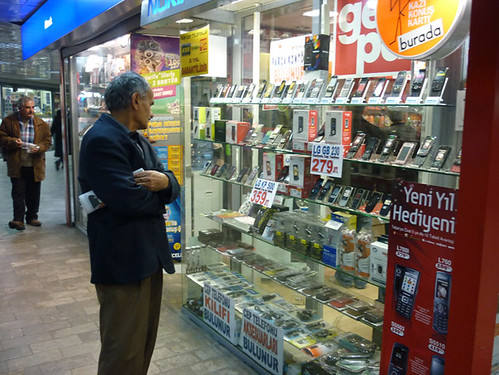
Before you get plagued by feelings of guilt, consider this: Most people alive today — especially in western industrialized countries, and certainly everyone reading this — were born into a life comforted by and dependent on fossil fuels. In other words, we’re all innocent victims as much as we’re active perpetrators in the massive destruction of our home planet. That’s a lot more complicated of a proposition than assigning blame to a few bad apples, but it is not only the most honest but I believe the most compassionate way to look at the problem.
Yes, Tony Hayward carries a disproportionate share of the responsibility by having chosen to seek his fortunes as the face of one of the most aggressively exploitative corporations in the world. Yes, BP is the biggest culprit in this disaster and may well pay the ultimate price — its own demise — for it. But we’d be fooling ourselves to think that BP and all the other oil companies exist in a vacuum. We’re truly in this together.
In our quest for an end-user simplicity bubble we’ve created a vast and complex system of accounting, production, communication and distribution that nobody truly understands anymore. Just look at the financial crises sweeping the planet as an example of how removed our life’s work and tangible realities have become from the complex parallel universe of the stock exchanges. We’re living on wealth and resources borrowed from mother Earth, burning and consuming what took millions of years to form in a matter of centuries. Capitalism has a nifty word for all the environmental debt we’re accruing, externalities, but mother Earth employs her own accountants.

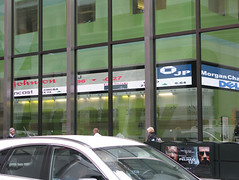
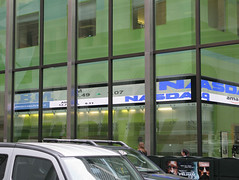



This is what it comes down to and what we as concerned and aware global citizens can do: Learn to become more sensitive to the incessant peddling of the false simplicity we’re constantly bombarded with. Pay attention to the long and winding story behind each of the neatly packaged products hurled our way every day. Expose not only the marketers’ and corporations’ blatant omissions of what went into making their shiny products, but also our own tendency to only look as far as the eye can see. Use those insights to make decisions about food, products and mobility with all their hidden costs and complexities in mind. Share your insights, but be kind to each other. Remember we’re all born into it and have to get out of it together. When it gets overwhelming, be kind to yourself.
Once we become a bit more inoculated to the instant gratification of modern day life it becomes easier to discover and appreciate a more true and intimate simplicity. Sinking your teeth into a juicy organic heirloom apple or digging your hands into the soil makes you shrug at the convenience of the supermarket. Working up a sweat and losing a few pounds while riding a bike to work makes you understand the fun of moving more slowly. Receiving a gift handmade from an old pallet will curb your desires for “cheap” plastic toys from China. That’s the beauty of true simplicity.
In that spirit, I’ll leave you with the last verse I wrote for the Kleenex song:
Go to the public bathroom, what do I see?
loads of crumpled paper towels, what used to be a tree.
Just wish there was a real towel, like back in the day.
So I just use my T-shirt, it’s softer anyway.
May your life be simple!
o~O~o~O~o~O~o~O~o~O~o~O~o~O~o~O~o~O~o~O~o~O~o~O~o~O~o~
cross-posted at daily kos




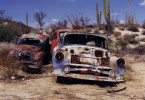
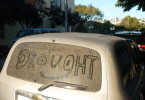


I raise my handmade ceramic cup and toast simplicity. And when I dribble a little tea or water on the table or floor, I sop it up with a towel or recycled piece of cloth…or the toe of my sock!
it would be an interesting blog post to list all the different ways in which one can take care of a spill without the old Kleenex… 😉
Sven,
I read your profound post–and have no idea what to say. I’m going to read your links in the piece and let it all sink in. Then I’ll be back.
I read the links and my neurons are fried. The problem is so BIG and so all-encompassing that I can’t see any ways to help fix things. It’s nice that people recycle their plastic and glass bottles, but that looks to me like trying to solve an Earth-sized problem with a dot of ink.
Maybe a new Earth really is being born–maybe it’s not crazy to believe that, because what can we do? Maybe some think-tank people who can see how the threads are all weaved together will also be able to see how to take it all apart and show us new-old ways to live. Maybe you are one of them.
You must have worked on this post for weeks–and it shows. All I can say is, WOW.
Thanks Pam, and I’m glad there was some useful stuff in there for you. Actually, one of the big themes for me is how to not get overwhelmed/depressed by the situation while also not being in denial. I actually think we can get our act together and change our ways so that we don’t weigh so heavy on mother Earth without perceiving it like a huge sacrifice. But for that we have to do some serious inner work, become aware of our assumptions, the parts of us that are really us and the parts that we’ve just internalized through our consumer culture. We’ve also got to get in touch with our own mortality and embrace it, because I think a lot of our most ingrained fears have to do with impermanence. My friend Barb is doing a very cool experiment with that and blogging about it at http://lastyeartolive.wordpress.com – check it out. Once we’re more comfortable with impermanence I think we can be better stewards of the earth, I think. It’s the end of the world as we know it, and I feel fine!